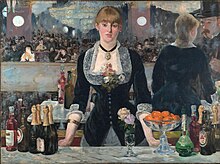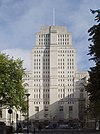Courtauld Institute of Art
 Somerset House, home of the Courtauld | |
| Type | Public |
|---|---|
| Established | 1932 |
Parent institution | University of London |
| Endowment | £38.7 million (2023)[1] |
| Budget | £28.4 million (2022–23)[1] |
| Chancellor | The Princess Royal (as Chancellor of the University of London) |
| Director | Mark Hallett[2] |
| Students | 605 (2022/23)[3] |
| Undergraduates | 270 (2022/23)[3] |
| Postgraduates | 330 (2022/23)[3] |
| Location | , United Kingdom 51°30′39″N 0°07′02″W / 51.51083°N 0.11722°W |
| Campus | Urban |
| Website | courtauld |
The Courtauld Institute of Art (/ˈkɔːrtəʊld/), commonly referred to as The Courtauld, is a self-governing college of the University of London specialising in the study of the history of art and conservation. It is among the most prestigious specialist colleges for the study of the history of art in the world and is known for the disproportionate number of directors of major museums drawn from its small body of alumni.[4][5]
The art collection is known particularly for its French Impressionist and Post-Impressionist paintings and is housed in the Courtauld Gallery. The Courtauld is based in Somerset House, in the Strand in London. In 2019, the Courtauld's teaching and research activities temporarily relocated to Vernon Square, London, while its Somerset House site underwent a major regeneration project.
History
[edit]The Courtauld was founded in 1932 through the philanthropic efforts of the industrialist and art collector Samuel Courtauld, the diplomat and collector Lord Lee of Fareham, and the art historian Sir Robert Witt.[6]
Originally the Courtauld was based in Home House, a townhouse designed by Robert Adam in Portman Square, Marylebone. The Strand block of Somerset House, designed by William Chambers from 1775 to 1780, has housed the Courtauld since 1989.[6]
The Courtauld has been an independent college of the University of London since 2002.[7]
The Courtauld has featured several times on the BBC's arts programme Fake or Fortune.[8] In April 2020, during the COVID-19 pandemic, the Institute offered digital "mini festivals" called "Open Courtauld Hour".[9][10]
Academic profile
[edit]The Courtauld Institute of Art is the major centre for the study of the history and conservation of art and architecture in the United Kingdom. It offers undergraduate and postgraduate teaching to around 400 students each year.[11] Degrees are awarded by the University of London.
The Courtauld was ranked first in the United Kingdom for History and History of Art in The Guardian's 2011 University Guide and was confirmed in this rank for research quality in the 2014 Research Excellence Framework.[12][13] The Independent has called it "probably the most prestigious specialist college for the study of the history of art in the world".[14]
The Courtauld was ranked, again, first in the United Kingdom for History and History of Art in The Guardian's 2017 University Guide.[15]
Research
[edit]According to the 2014 Research Excellence Framework, the Courtauld hosts the highest proportion of the UK's world-leading and internationally excellent research among all higher education institutions with 95% of research rated in the top two categories (4*/3*), 56% of which was rated in the 4* category, tied for highest in the UK with London Business School.[16]
Undergraduate study
[edit]The only undergraduate course offered by the Courtauld is a BA in the History of Art. This is a full-time course designed to introduce students to all aspects of the study of art history.[17]
Postgraduate study
[edit]Several taught courses are offered at postgraduate level: master's degrees in history of art, curating the art museum, the history of Buddhist art, and the conservation of wall paintings are taught alongside diploma courses in the conservation of easel paintings and the history of art.[18] Students in the history of art master's programme have to choose a specialisation ranging from antiquity to early modern to global contemporary artwork. Special options are taught in small class sizes of 5–10 students.
Study resources
[edit]
The Courtauld has two photographic libraries which originated as the private collections of two benefactors: the Conway Library, covering architecture, architectural drawings, sculpture and illuminated manuscripts, named after Lord Conway of Allington, and the Witt Library, after Sir Robert Witt, covering paintings, drawings and engravings, and containing over two million reproductions of works by over 70,000 artists.[19][20] In 2009, it was decided that the Witt Library would not continue to add new material to the collection,[21] and in 2017 a mass digitisation project which will make both Witt and Conway items available online commenced as part of Courtauld Connects.[22][20]
The book library is one of the UK's largest holdings of art history books, periodicals and exhibition catalogues. There is a slide library which also covers films, and an IT suite.[23][24]
An online image collection provides access to more than 40,000 images, including paintings and drawings from the Courtauld Gallery, and over 35,000 photographs of architecture and sculpture from the Conway Library.[25] Two other websites sell high-resolution digital files to scholars, publishers and broadcasters, and photographic prints to a wide public audience.[26][27]
The Courtauld uses a virtual learning environment to deliver course material to its students.[28] Since 2004, the Courtauld has published an annual research journal, Immediations, edited by current members of the research student body. Each cover of the journal has been commissioned by a leading contemporary artist.[29] Additionally, together with the Warburg Institute, the institute publishes The Journal of the Warburg and Courtauld Institutes, an annual publication of about 300 pages (ISSN 0075-4390).[30]
The Courtauld Gallery
[edit]
The Courtauld's art collection is housed in the Courtauld Gallery. The collection was begun by the institute's founder, Samuel Courtauld, who presented an extensive collection of mainly Impressionist and Post-Impressionist paintings in 1932. It was enhanced by further gifts in the 1930s and a bequest in 1948, and has since received many significant donations and bequests. The gallery contains some 530 paintings and over 26,000 drawings and prints.[31] Since 1989 the gallery been housed in the Strand block of Somerset House, which was the first home of the Royal Academy, founded in 1768. In April 2013 the Head of the Courtauld Gallery was Ernst Vegelin.
Notable people associated with the Courtauld
[edit]
The Courtauld is well known for its many graduates who have become directors of art museums around the world.[5] These include the Metropolitan Museum of Art, New York; the Museum of Modern Art, New York; the National Gallery, London; the National Portrait Gallery, London; the British Museum, London; the Tate, London; the Fine Arts Museums of San Francisco, San Francisco; the National Gallery of Art, Washington; and the Museo del Prado, Madrid. The number of notable alumni in the fine arts has earned graduates the "Courtauld Mafia" nickname.[32]
Directors
[edit]The directors of the Courtauld have been:
| William George Constable | 1932–1936 |
| T. S. R. Boase | 1936–1947 |
| Anthony Blunt | 1947–1974 |
| Peter Lasko | 1974–1985 |
| Michael Kauffmann | 1985–1995 |
| Eric Fernie | 1995–2003 |
| James Cuno | 2003–2004 |
| Deborah Swallow | 2004–2023 |
| Mark Hallett | 2023–present[33] |
References
[edit]- ^ a b "Annual Report and Financial Statements 2022/23" (PDF). Courtauld Institute of Art. Retrieved 18 January 2024.
- ^ "Mark Hallett welcomed as Märit Rausing Director". The Courtauld. 1 August 2023. Retrieved 15 September 2023.
- ^ a b c "Where do HE students study?". Higher Education Statistics Agency. Retrieved 23 September 2024.
- ^ Chaplin, Elizabeth (1994). Sociology and Visual Representation. New York: Routledge. pp. 53–56. ISBN 0415073626.
- ^ a b Simon, Robin (19 September 2007). "Masters of the Artistic Universe". The Spectator. Retrieved 5 August 2014.
- ^ a b "History". The Courtauld Institute of Art. 2015–2019. Retrieved 28 February 2019.
- ^ Simon, Robin (14 September 2021). "Masters of the artistic universe". The Spectator. Archived from the original on 14 September 2021. Retrieved 14 September 2021.
- ^ "Master forgery: '17th century work exposed as a fake'". www.telegraph.co.uk. Archived from the original on 12 January 2022.
- ^ "Open Courtauld Hour: New Free Digital Events Series". The Courtauld. 23 April 2020. Retrieved 13 December 2021.
- ^ Busiakiewicz, Adam (23 April 2020). "Open Courtauld Hour". www.arthistorynews.com. Retrieved 13 December 2021.
- ^ Academic Staff, Information for students. The Courtauld Institute of Art. Accessed April 2013.
- ^ "University guide 2011: History and history of art | Education". theguardian. 7 June 2010. Retrieved 9 March 2015.
- ^ "Results & submissions : REF 2014 : View results and submissions by UOA". Results.ref.ac.uk. Retrieved 9 March 2015.
- ^ "Courtauld Institute of Art (University of London) – A-Z Unis & Colleges – Getting into University". The Independent. 16 July 2014. Retrieved 9 March 2015.
- ^ "University University league tables 2017 – the full rankings". The Guardian. Retrieved 20 July 2016.
- ^ "University Research Excellence Framework 2014 – the full rankings". The Guardian. Retrieved 30 June 2015.
- ^ "BA (Hons) History of Art". The Courtauld Institute of Art. 2015–2019. Retrieved 28 February 2019.
- ^ "Postgraduate Taught Courses". The Courtauld Institute of Art. Retrieved 20 July 2016.
- ^ Image Libraries: Witt Library. The Courtauld Institute of Art, 2009. Accessed April 2013.
- ^ a b Bilson, Tom (2020). "The Courtauld's Witt and Conway Photographic Libraries: Two approaches to digitisation". Art Libraries Journal. 45 (1): 35–42. doi:10.1017/alj.2019.38. ISSN 0307-4722. S2CID 213834389.
- ^ Courtauld Institute: Cuts Challenge Witt Library. ArtLyst, 30 March 2010. Accessed April 2013.
- ^ "Discoveries from Our Photographic Archives".
- ^ "Courtauld Image Libraries". The Courtauld Institute of Art. 2015–2019. Retrieved 28 February 2019.
- ^ "Student IT Services". The Courtauld Institute of Art. 2015–2019. Retrieved 28 February 2019.
- ^ Art and architecture. The Courtauld Institute of Art. Accessed April 2013.
- ^ Courtauld Images. The Courtauld Institute of Art. Accessed April 2013.
- ^ Courtauld Prints. Courtauld Gallery of Art. Accessed April 2013.
- ^ Virtual Learning Environment Archived 9 October 2010 at the Wayback Machine. The Courtauld Institute of Art. Accessed April 2013.
- ^ "About immediations". The Courtauld Institute of Art. 2015–2019. Retrieved 28 February 2019.
- ^ "Journal of the Warburg and Courtauld Institutes". Retrieved 25 January 2023.
- ^ John Murdoch, The Courtauld Gallery at Somerset House. London: Thames & Hudson, 1998, p. 7.
- ^ Simon, Robin (17 September 2007). "Masters of the Artistic Universe". The Spectator.
- ^ "Mark Hallett welcomed as Märit Rausing Director". The Courtauld. 1 August 2023. Retrieved 15 September 2023.

